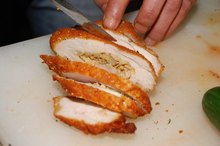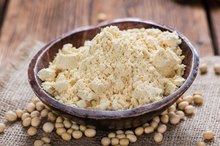What does fact checked mean?
At Healthfully, we strive to deliver objective content that is accurate and up-to-date. Our team periodically reviews articles in order to ensure content quality. The sources cited below consist of evidence from peer-reviewed journals, prominent medical organizations, academic associations, and government data.
- Current Opinion in Clinical Nutrition and Metabolic Care: Proteins and Satiety: Implications for Weight Management
- Current Opinion in Clinical Nutrition and Metabolic Care: Proteins and Satiety: Implications for Weight Management
- Harvard Health Publications: Calorie Counting Made Easy
- Trends in Endocrinology and Metabolism: Artificial Sweeteners Produce the Counterintuitive Effect of Inducing Metabolic Derangements
- Trends in Endocrinology and Metabolism: Artificial Sweeteners Produce the Counterintuitive Effect of Inducing Metabolic Derangements
- Academy of Nutrition and Dietetics: Strength Building and Muscle Mass
The information contained on this site is for informational purposes only, and should not be used as a substitute for the advice of a professional health care provider. Please check with the appropriate physician regarding health questions and concerns. Although we strive to deliver accurate and up-to-date information, no guarantee to that effect is made.
When to Drink Muscle Milk Light for Weight Loss
Muscle Milk Light is an excellent source of dietary protein, vitamins and minerals -- and is lower in calories than regular Muscle Milk. However, it’s also expensive and not necessary for effective weight loss. If drinking Muscle Milk Light helps you lower your overall caloric intake, it may be the right weight-loss tool for you.
Calorie Content
The calories you consume -- and expend -- daily determine how much weight you’ll lose, if any. Switching from regular to Light Muscle Milk may help lower your overall caloric intake. One 8-ounce portion of vanilla Muscle Milk Light provides just 90 calories, which is about the same number of calories found in skim milk. Eight ounces of regular vanilla Muscle Milk contain 128 calories.
- The calories you consume -- and expend -- daily determine how much weight you’ll lose, if any.
- One 8-ounce portion of vanilla Muscle Milk Light provides just 90 calories, which is about the same number of calories found in skim milk.
Protein Benefits
The Difference Between Muscle Milk & Muscle Milk Collegiate
Learn More
The majority of the calories in Muscle Milk Light are from dietary protein, which is beneficial for weight loss because protein increases satiation and plays a key role in weight loss, according to a review published in 2008 in “Current Opinion in Clinical Nutrition and Metabolic Care.” Authors of this review report that high-protein diets also help spare loss of muscle and changes in metabolism associated with weight loss 1. An 8-ounce container of Muscle Milk Light provides 14 grams of dietary protein. In comparison, 1 cup of skim milk contains 8 grams of protein, a cup of yogurt provides about 13 grams and 1 cup of low-fat cottage cheese contains 28 grams of dietary protein.
Potential Drawbacks
Muscle Milk Light is much more expensive than most protein-rich foods. Furthermore, Muscle Milk Light contains sucralose, which is an artificial sweetener. A review published in 2013 in “Trends in Endocrinology and Metabolism” found that consuming calorie-free, artificial sweeteners -- such as sucralose -- actually puts you at risk for weight gain because these products taste sweet and can interfere with your body’s normal response of getting energy from sweet-tasting sugars 3.
- Muscle Milk Light is much more expensive than most protein-rich foods.
- A review published in 2013 in “Trends in Endocrinology and Metabolism” found that consuming calorie-free, artificial sweeteners -- such as sucralose -- actually puts you at risk for weight gain because these products taste sweet and can interfere with your body’s normal response of getting energy from sweet-tasting sugars 3.
Bottom Line
How to Make a Muscle Milk Shake
Learn More
Drinking Muscle Milk Light can help you meet your daily protein needs -- without the extra calories -- during weight loss. However, you don’t have to take dietary protein supplements, such as Muscle Milk Light, to lose weight. Talk with your doctor to weigh the potential benefits of Muscle Milk Light with possible drawbacks of drinking it. If you want to lose weight without the added expense of protein supplements -- and without using artificial sweeteners -- simply reduce your caloric intake and eat a variety of healthy foods -- such as:
- fruits
- vegetables
- legumes
- nuts
- seeds
- whole grains
- low-fat dairy foods
- lean meats
- egg whites
- soy products
- seafood
- skinless poultry
- plant-based oils
- Drinking Muscle Milk Light can help you meet your daily protein needs -- without the extra calories -- during weight loss.
Related Articles
References
- Current Opinion in Clinical Nutrition and Metabolic Care: Proteins and Satiety: Implications for Weight Management
- Harvard Health Publications: Calorie Counting Made Easy
- Trends in Endocrinology and Metabolism: Artificial Sweeteners Produce the Counterintuitive Effect of Inducing Metabolic Derangements
- Milk, reduced fat (2%). FoodData Central. U.S. Department of Agriculture. Published April 1, 2019.
- Månsson HL. Fatty acids in bovine milk fat. Food Nutr Res. 2008;52. doi:10.3402/fnr.v52i0.1821
- Wadolowska L, Sobas K, Szczepanska JW, Slowinska MA, Czlapka-Matyasik M, Niedzwiedzka E. Dairy products, dietary calcium and bone health: possibility of prevention of osteoporosis in women: the Polish experience. Nutrients. 2013;5(7):2684-707. doi:10.3390/nu5072684
- Varenna M, Manara M, Galli L, Binelli L, Zucchi F, Sinigaglia L. The association between osteoporosis and hypertension: The role of a low dairy intake. Calcif Tissue Int. 2013;93(1):86-92. doi:10.1007/s00223-013-9731-9
- Cormick G, Ciapponi A, Cafferata ML, Belizán JM. Calcium supplementation for prevention of primary hypertension. Cochrane Database Syst Rev. 2015;(6):CD010037. doi:10.1002/14651858.CD010037.pub2
- National Cancer Institute. Calcium and cancer prevention. Updated May 4, 2009.
- Radavelli-Bagatini S, Zhu K, Lewis JR, Dhaliwal SS, Prince RL. Association of dairy intake with body composition and physical function in older community-dwelling women. J Acad Nutr Diet. 2013;113(12):1669-74. doi:10.1016/j.jand.2013.05.019
- Josse AR, Tang JE, Tarnopolsky MA, Phillips SM. Body composition and strength changes in women with milk and resistance exercise. Med Sci Sports Exerc. 2010;42(6):1122-30. doi:10.1249/MSS.0b013e3181c854f6
- Rautiainen S, Wang L, Lee IM, Manson JE, Buring JE, Sesso HD. Dairy consumption in association with weight change and risk of becoming overweight or obese in middle-aged and older women: a prospective cohort study. Am J Clin Nutr. 2016;103(4):979-88. doi:10.3945/ajcn.115.118406
- Flom JD, Sicherer SH. Epidemiology of cow's milk allergy. Nutrients. 2019;11(5). doi:10.3390/nu11051051
Writer Bio
Erin Coleman is a registered and licensed dietitian. She also holds a Bachelor of Science in dietetics and has extensive experience working as a health writer and health educator. Her articles are published on various health, nutrition and fitness websites.









